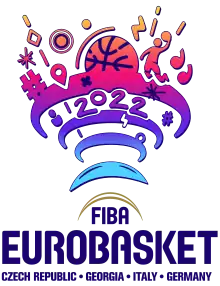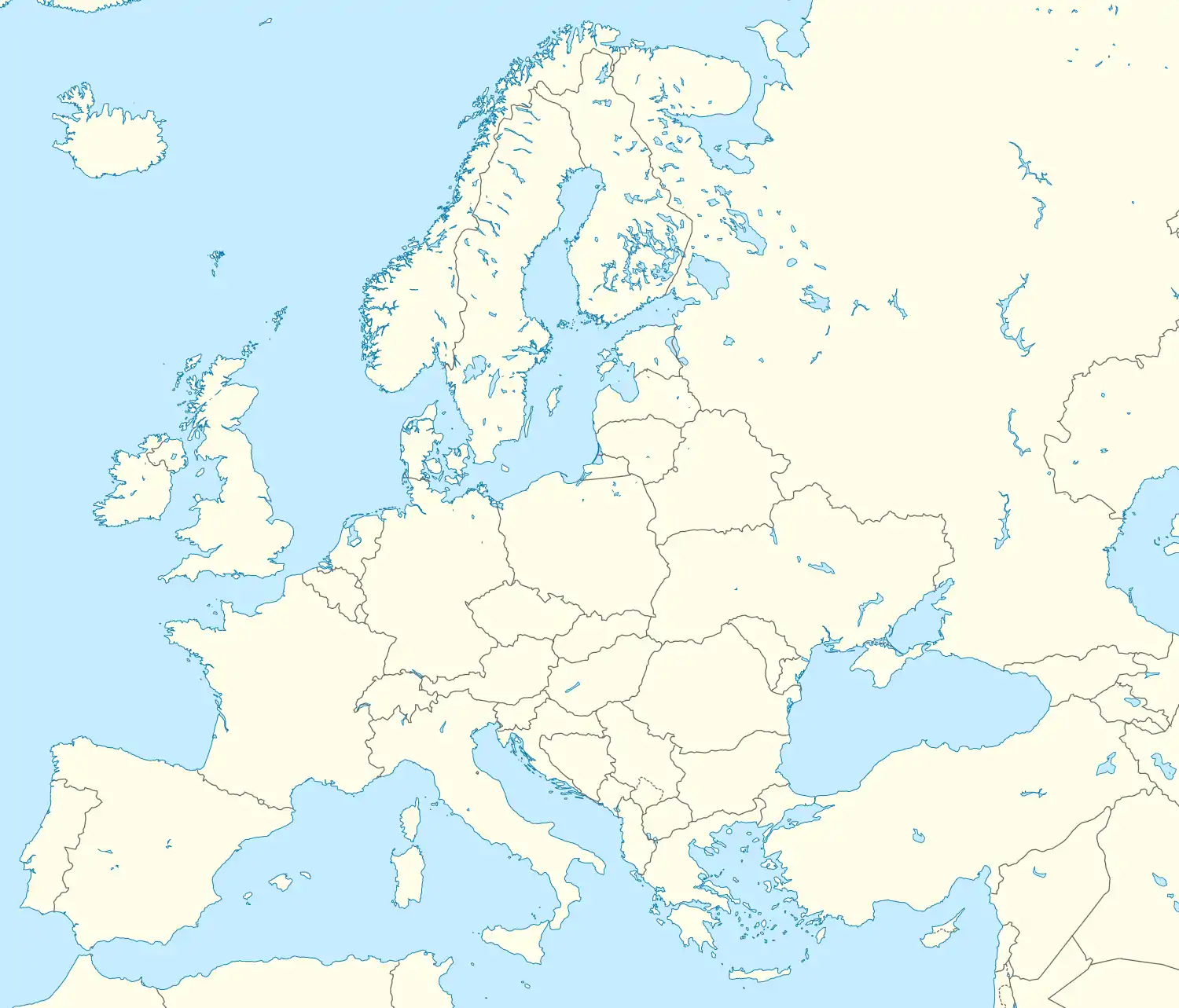EuroBasket 2022
The EuroBasket 2022 will be the 41st edition of the EuroBasket championships organized by FIBA Europe: the first since it was agreed it would take place every four years, with a similar system of qualification as for the FIBA Basketball World Cup.[1] It was originally scheduled to take place between 2 and 19 September 2021, but due to the COVID-19 pandemic and the subsequent postponement of the 2020 Summer Olympics to 2021, it has been postponed to 1 to 18 September 2022.[2]
 | |
| Tournament details | |
|---|---|
| Host countries | Czech Republic Georgia Germany Italy |
| Dates | 1–18 September 2022 |
| Teams | 24 |
| Venue(s) | 5 (in 5 host cities) |
Like the previous two editions, the tournament will be co-hosted by four countries. Games in the group stage will be held in the Czech Republic, Georgia, Germany, and Italy. The knock-out phase will be played in Berlin, Germany.
Host selection
For EuroBasket 2015 and 2017, FIBA Europe opened three bidding options for hosting: to host a preliminary group, to host the final round, or to host the entire tournament. In the end, each of these two tournaments was hosted in four cities in four countries. It will be hosted by four nations for the third time.
Seven counties submitted separate candidacies to host Eurobasket 2022:[3][4]
Czech Republic, Georgia, Germany and Italy were selected as host countries on 15 July 2019 at the Central Board in Munich, Germany.
Venues
| Berlin |  Berlin Cologne Milan Prague Tbilisi EuroBasket 2022 (Europe) | |
|---|---|---|
| Mercedes-Benz Arena | ||
| Capacity: 14,500[5] | ||
 | ||
| Cologne | ||
| Lanxess Arena | ||
| Capacity: 19,500 | ||
 | ||
| Milan | Prague | Tbilisi |
| Mediolanum Forum | O2 Arena | Tbilisi Sports Arena |
| Capacity: 12,700 | Capacity: 16,805 | Capacity: 15,000 |
 |
 |
|
Qualification
The qualification started in November 2017, with nine teams participating in the pre-qualifiers, including the five eliminated teams from the 2019 World Cup European Pre-Qualifiers. The co-hosts (Czech Republic, Georgia, Germany and Italy) will participate in qualifiers, but have already qualified to the EuroBasket 2022.
Qualified teams
| Team | Qualification method | Date of qualification | App | Last | Best placement in tournament |
|---|---|---|---|---|---|
| Host nation | 15 July 2019 | 6th | 2017 | 7th place (2015) | |
| Host nation | 15 July 2019 | 5th | 2017 | 11th place (2011) | |
| Host nation | 15 July 2019 | 25th | 2017 | Champions (1993) | |
| Host nation | 15 July 2019 | 38th | 2017 | Champions (1983, 1999) | |
| Group D top three | 29 November 2020 | 14th | 2017 | Third place (1993, 1995) | |
| Group H top three | 29 November 2020 | 28th | 2017 | Champions (1987, 2005) | |
| Group H top three | 29 November 2020 | 10th | 2015 | 8th place (1993) | |
| Group A top three | 30 November 2020 | 30th | 2017 | Runners-up (1979) | |
| Group F top three | 30 November 2020 | 14th | 2017 | Champions (2017) | |
| Group F top three | 30 November 2020 | 9th | 2017 | 6th place (2013) | |
| Group A top three | 30 November 2020 | 32nd | 2017 | Champions (2009, 2011, 2015) |
Marketing
Logo
The official logo was unveiled on 16 December 2019.[6]
References
- "PR N°20 - Central Board gives green light to new format and calendar of competition". FIBA. 11 November 2012. Archived from the original on 20 December 2013. Retrieved 8 January 2020.
- "FIBA's Executive Committee confirms global calendar update". FIBA. 9 April 2020.
- "Znane so protikandidatke Slovenije za Eurobasket" (in Slovenian). 25 March 2019. Retrieved 25 March 2019.
- "Poznato sedam kandidata za Evrobasket 2022. godine". novosti.rs (in Serbian). Retrieved 25 March 2019.
- Euroleague.net "the 16,000-seat o2 World".
- "FIBA EuroBasket 2021 logo unveiled". FIBA.basketball. 16 December 2019. Retrieved 8 January 2020.